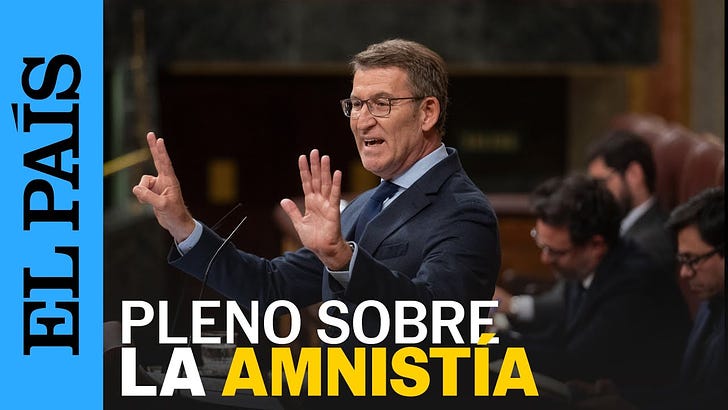🎗️This Week in Spain: The Amnesty Debate Begins
Also: Zara puts foot in mouth and a big frog gets evicted.
By @IanMount and @AdrianBono | December 14, 2023 | Madrid | Issue #37
🎉 Welcome to The Tapa, an English-language, weekly newsletter about all things Spain!
🥜 This Week in a Nutshell: The amnesty law fight started to get real (in Parliament). Junts continued to make controversial statements that put the PSOE coalition government in an awkward spot and Vox’s Santiago Abascal got in trouble for making a bad comparison while in Argentina. If you thought things were going to cool down before the holidays, you were very wrong.
🙏 Remember that if this email gets truncated at the bottom because it’s too long, just click here to read the rest on Substack.
🙌 But wait, there’s more! The Tapa this week began offering paid subscriptions, and we’d be deeply thrilled if you purchased one to help build this enterprise we’ve had so much fun creating. And a big THANK YOU to those who already have.
🕺If you haven’t subscribed yet, please do so by clicking on the button below.
🫶 And if you already have, please send this newsletter around to your friends and family and help us keep growing.
Yes, this is still a thing
Parliament Begins Debating the Controversial Amnesty Law
After weeks of angry protests, the first bill to be debated by this new Parliament is—you guessed it!—the amnesty bill. And boy, is the right unhappy.
The center-right PP’s leader Alberto Núñez Feijóo didn’t hold back. While Prime Minister Pedro Sánchez was not present during Tuesday’s parliamentary session, Feijóo took the floor to address MPs and explain why, in his view, this bill doesn’t solve any problem in Catalonia but actually “extends it” to all of Spain.
“This is the saddest and most decadent parliamentary session since that evening of February 23,” he said, in reference to the 1981 coup attempt commonly known as 23F.
Feijóo also called the amnesty a “national shame and an international disgrace” because it is the product of “electoral fraud” and represents “political corruption” by going “against coexistence, separation of powers,” and the equality of all Spanish people. In other words, it’s bad. Very bad.
The PP head went on: “Sánchez lost the elections, and the only way to become president was to grant whatever was necessary to the independents,” and then Feijóo highlighted that, before the summer national elections, the PSOE thought granting amnesty to the Catalonian separatists was “unconstitutional”. Oh, how things change.
Indeed they did. Everything changed after July 23, when Sánchez suddenly needed seven votes to get a majority in Parliament and the only party that could give them to him was Junts, led by Catalonian separatist (and outlaw) Carles Puigdemont. Who, you know, would benefit from amnesty.
“They can dress it up with excuses, or constitutional law masterclasses, they can try to downplay its scope, ignore the Constitution… but nothing will change that this is the first payment of an investiture they bought with seven votes,” Feijóo complained (because that’s really all he can do, being that he doesn’t have the votes to change anything).
Far-right Vox leader Santiago Abascal was also pretty mad (and hurt, as it turns out).
It is no secret that the far-right leader is outraged by the amnesty bill, which he calls a “blow to the Constitution, to the equality of Spaniards before the law, to the judicial power, to the Rule of Law, and to the dignity, coexistence, and prosperity of Spaniards”. Really, to Spain.
But he also complained to Feijóo a lot for refusing to join forces with Vox to protest the bill, and particularly because on Sunday the PP leader condemned Abascal for his statements during an interview with Argentine media. (Intrigued? More on that below).
Far from Madrid (and conveniently, from the debate), PM Sánchez flew to Strasbourg on Tuesday, to address the EU Parliament Wednesday as Spain’s presidency of the EU Council comes to a close.
Sánchez spoke about what he did while holding the presidency for the last six months, his “achievements”, his criticism to the Gaza bombings and, of course, the amnesty law which he defended vehemently. Oh, and he blasted the Europe-wide PP group and its leader, Manfred Weber, who has harshly criticized the amnesty deal. So, making friends.
"Europe has gained a progressive ally," he said, adding that voters in Spain had had to decide between a pact of the right and the far-right that would “repeal social, economic, and environmental advancements” and apply “failed neoliberal recipes” and progressive forces that work to forward “social justice, labor dignity, respect for coexistence” and other good causes like feminism and the green transition. To simplify: me good, them bad, black and white. That was easy, right?
But then Carles Puigdemont took center stage.
Puigdemont hasn’t been making thing easy for Sánchez (remember his flirtation with the PP two weeks ago?) and he wasn’t about to start on Wednesday. Addressing the Prime Minister from the lectern during the EU Presidency Council Meeting, Puigdemont decidedly took aim at him.
Sure, his party Junts may have helped Sánchez become Prime Minister but that doesn’t mean they are friends. In fact, both separatist Catalonian parties Junts and ERC constantly criticize Sánchez and his party for not doing “enough” for their region.
Puigdemont warned Sánchez that “failure to fulfill promises creates distrust” and criticized him for still not being able to address MPs in Catalan during EU plenary sessions (you may recall that this was something Spain tried to push through—and failed—as other EU countries thought there were plenty more pressing matters to discuss).
And then it got worse: “Today I address you in your mother tongue… not mine,” he said speaking Spanish. “My freedom of expression is worth less than yours. Mr. Sánchez, opportunities should be seized. If they are ignored, consequences are not pleasant”.
This was the first time Pedro Sánchez and Carles Puigdemont came face to face in public and interacted since the Catalan leader fled to Brussels to avoid arrest in the aftermath of the illegal 1-O independence referendum (and he remains a fugitive from Spanish law, at least until the amnesty is approved).
Sánchez didn’t fire back, however. He simply responded that it’s in both their hands to achieve the amnesty law, which he said was “an important step” and has support by a “broad majority in Parliament”. Oh, and he’ll keep pushing Catalan inside Spain. In other words, the clash was more Kabuki theater than a fight to the death.
Oh, and in case you’re wondering, on the first voting of the bill this Tuesday, it was passed with 178 votes in favor (and 172 against). So, broad majority? Well, at least a majority.
🔔 A Message From Our Sponsor
Bucólico Café is a project of connection that was born as a specialty coffee shop.
We value time and understand that it represents both a cycle and an instant—chronology and nostalgia. Bucólico is a space that connects one’s soul with the purity, lightness and beauty of the countryside—while being in the city. Via a cup of coffee, a piece of cake or a song…
Located on Calle de Barbieri 4 — a few blocks from Plaza Chueca — Bucólico reassures the soul with a feeling of home.
Follow Bucólico Café on Instagram.
💬 Five things to discuss at dinner parties this week
1. Vox’s Abascal angers everyone but Vox
Santiago Abascal was in Argentina this weekend, where he attended the presidential inauguration of “anarcho-capitalist” Javier Milei (and presumably ate a good steak). United by their dislike for the left, they have been expressing mutual support via social media (and sometimes even recorded messages at political rallies) since the Argentine economist announced he was running for president.
Abascal made the media rounds in Buenos Aires, and talked to Argentine media juggernaut Clarín. There, the far-right leader criticized PM Sánchez saying he has “sold his principles” and will do “anything” to stay in power, and added that “there will be a moment when the people will want to hang him by his feet”. You know, just like Italians did after they killed fascist dictator Benito Mussolini in 1945. Not a subtle metaphor.
The outrage was immediate. PSOE leaders accused Abascal of making comments that “incited hatred” against the prime minister and that, one day, “we may have to regret irreparable harm” for them.
Sánchez’s cabinet director Oscar López said “this level of hatred and insult is unbearable and intolerable” and socialist parliamentary spokesperson Patxi López (no relation), said Abascal was “a totalitarian who has crossed all limits” after hanging out with Hungary’s Viktor Orban in Argentina and “threatening” the Prime Minister.
Indignation escalated as folks on the left called for the PP to break up the coalition governments it has with “neo-fascist Vox” in several autonomous communities. Pedro Sánchez himself accused Abascal of "inoculating hatred" and asked PP leader Feijóo for "reflection" on his alliances with that "hateful party."
Feijóo came out to publicly condemn Abascal’s statements, calling his words “regrettable”. But then he also said that they were in line with “the PSOE’s game of dividing Spain”.
But despite the widespread condemnation, neither Abascal nor Vox backed down. Vox spokesperson Ignacio Garriga said on Monday that his party’s leader “was only reminding people of the fate of many dictators”. You know, just a little historical allusion, right?
Never a dull week here.
2. 📕 Pedro Sánchez ‘wrote’ a book and everyone’s a critic
There are many things you can do with Pedro Sánchez’s new book, Tierra firme. You could, for example, read it. You could use it as a paperweight, or as a coaster. And you could put it on the shelf next to his previous book to show you were a fan. One thing you can’t do? Comment on it on Amazon.es. But more on that in a minute.
Sánchez presented his newly published political memoir of the last 4 years on Monday in Madrid’s Círculo de Bellas Artes, where he was interviewed by TV presenter Jorge Javier Vázquez (of Sálvame and Supervivientes 2024 fame) and journo Ángeles Caballero in front of a friendly, docile crowd that in no way would think of yelling “¡Que te vote Txapote!” at the PM.
Vázquez talked. A lot. He made jokes, like saying that Sánchez had been in his life for 10 years, which was longer than any other man. He asked really long questions. He made observations. In fact, he talked so much that someone can be heard at the 14:14 point in the video above saying, “Calle, hombre.” Shut up, man.
The presentation was actually an official work event. Or at least it seemed like it. The official Moncloa site and Presidency accounts on Twitter, Facebook and YouTube streamed it, and 14 of Sánchez’s cabinet members attended, sitting together to listen to Dad him speak.
In fact, it apparently was more of a work event than the presentation of the amnesty law, which Sánchez had scheduled for parliamentary debate on a day when he was flying to Strasbourg to speak to another parliament (see above) and which was attended by fewer cabinet members than the book launch.
With all this work, how did he have time to write the book anyway? It seems like he didn’t. The book was apparently ghost-written by Irene Lozano, the former PSOE MP and head of Espána Global (Spain’s national marketing arm) and importantly, a writer, who wrote his previous book Manual de resistencia based on recorded conversations with him.
Guess who’s not in the book? Catalan separatist boss Carles Puigdemont—you know, the guy who this amnesty thing is for— reportedly does not grace the pages. Odd, that.
Which gets us back to Amazon. You may have noticed that Sánchez is pretty controversial these days, especially for folks on the right (but also for plenty on the center and left). Protestors yelled at his cabinet members as they arrived for the book events. But how could you get your ire to a bigger audience? Well, what better way to troll Sánchez than to give his book negative reviews!
His book is currently rated at 2.8 out of 5 stars, with 16 of the 31 reviews giving him the minimum one. But it seems like, you know, they might have been review-bombing Sánchez, and not the book. So Amazon closed the site to new reviews of the book because of this, um, strange activity, and posted the following note.
Sánchez got the last laugh though (or the Moncloa has an extensive bulk buying program). Terre firme was #7 on Amazon’s best-selling books list at the time of writing.
3. 🤝 These 2 symmetrical events have absolutely nothing to do with one another—promise!
The PSOE socialists’ Navarra branch (PSN) announced it will vote with the Basque far-left EH Bildu party in a no-confidence vote to unseat Pamplona’s mayor, from the center-right Unión del Pueblo Navarro (UPN), and replace her with EH Bildu’s leader on the city council.
The backstory: The UPN mayor, Cristina Ibarrola, came to power in 2023 after her party won the most seats in city council (9 out of 27). The left-wing parties (including the PSN, EH Bildu and other) had 16, but the PSN’s local head Elma Saiz vowed during the campaign that she wouldn’t support the EH Bildu boss, former mayor Joseba Asiron, for the mayoralty.
Why? EH Bildu is kind of toxic for its past links with the ETA terrorist group, and that toxicity went Full Monty just before the 28M regional elections when it announced it would run 44 convicted ETA members and associates—including seven convicted for murder (it later withdrew the plan). After the PSOE got whooped on 28M, the last thing it wanted was to lose more votes by cozying up to EH Bildu.
So what changed? Well, Sánchez and the PSOE got just enough seats in the snap 23J national elections to form a government with the support of all sorts of other parties—including EH Bildu. And now that no elections are planned for four more years and people’s memories are short, why not cozy up to EH Bildu?
Plus, Pamplona’s been a paralyzed mess. Since the UPN’s Cristina Ibarrola took the top job, the minority government, with the votes of the PP, hasn’t been able to build consensus to pass a budget (it’s still uses the 2021 budget) or much of anything else, and Ibarrola has been the center of various controversies, from letting a jewelry chain use her image for marketing to suspending various public works.
Oh, and there’s something else. EH Bildu abstained in the August vote to elect the regional governor of Navarra, allowing the PSOE’s María Chivite to repeat in the job. And then backed Pedro Sánchez for PM. So—surprise!—now pretty much everyone is pointing at this move as payback for EH Bildu’s help.
Everybody, that is, except the PSOE. Which claims, loudly but unconvincingly, that there’s nothing to see here. “It is radically false that this is a consequence of the investiture of Pedro Sánchez. He has not been paid for anything or anyone,” PSN leader Ramón Alzórriz said. There’s a saying about protesting too much, right?
And the PP is ticked off. Which is not surprising. PP leader Alberto Núñez Feijóo referred to it as the “hooded pact between Sánchez and [EH Bildu leader Arnaldo] Otegi”, nodding to the masks ETA terrorists wore, and added that the chances for understanding and agreements between the PSOE and the PP, already scarce, were now much lower. These guys really need some couples counseling!
Ultimately, this is a risky move for the PSOE. Historically, the socialists have said they would not back EH Bildu candidates until the party engaged in self-criticism and contrition over its past complicity with ETA. That hasn’t happened, making the recent move seem cynical at best, no matter how poorly Ibarrola was governing.
The no-confidence vote is expected on Dec. 28 at noon.
4. 😐 Unfortunate timing for those Zara ads
 Tiktok failed to load.
Tiktok failed to load.Enable 3rd party cookies or use another browser
Spanish fast-fashion giant Zara/piggy bank for Spain’s richest man had a rare misstep this week when images from a new marketing campaign went viral for all the wrong reasons.
The Zara campaign, dubbed “The Jacket,” was photographed by Tim Walker and featured model Kristen McMenamy. In the images, McMenamy wears Zara clothing as she holds a human form wrapped in white cloth—apparently meant to be an unfinished sculpture.
The wrapped mannequin bears a more than passing resemblance to the shrouded bodies of dead Palestinians killed in the war in Gaza. Like pretty much an exact resemblance.
Social media folks noticed this and began posting anti-Zara content under #boycottzara, a hashtag that had been viewed more than 28 million times on Tiktok by Tuesday afternoon. Not good advertising!
Zara deleted the online images and apologized on Tuesday, making the plausible argument that the campaign had been conceived in July and shot in September. This, however, does not explain how exactly nobody noticed the crystal clear resemblance between the pictures and dead Palestinians in funeral shrouds. Like, nobody? Seriously?
It wasn’t all bad news for Zara this week. Its shares hit an all-time high on Wednesday after it posted a 14% rise in pre-holiday sales, as well as a net profit of €4.1bn for the nine-months ending in October, up 32.5% from the year before. And on Tuesday it launched its second.hand clothing sales platform as well as its clothing repair service.
So Zara/Inditex owner (and Spains’’s richest man) Amancio Ortega will be just fine, in case you’re worrying.
5. 🐸 The frog might not be great art, but we’d like to keep it
Madrid’s regional superior court ruled this week that the Casino Gran Madrid located on Recoletos, across the street very wide avenue from Plaza de Colón, would have to remove the gigantic sculptural frog it installed on the sidewalk in 2014. This makes the artist behind it, Eladio de Mora (aka dEmo) sad. And us a bit too.
The big-ass froggy, titled “Rana de la fortuna” (it’s meant to bring luck with money) was meant to be donated by the casino to the city, presumably as a thanks to the regional government of Esperanza Aguirre which allowed a casino to open in the city after years of prohibition.
The 3.5-meter tall frog was originally licensed to occupy the spot for a year, but its license was extended again and again until 2021, when it ran out, and the legal battle began. That battle ended this week with a final sentence—it’s gotta go.
The saddened Artist dEmo told ABC that it was especially important to have a sculpture in his adopted home—he grew up in the industrial suburb of Getafe—and that art needed to be in the streets.
“It upsets me because, 10 years ago we were forced to do brutal work in the street with everything they asked for from the municipal level, and it was done—so why now do they say it is annoying. I don't understand,” he said. Plus, he added, how is it annoying if it’s on a massive sidewalk and he make it bigger than originally planned because he was told to?
It’s not a bad question. We can testify that both kids and adults have come to love it’s awkward weirdness, and it is rather easy to walk under considering the long legs raise the torso so high above the street. Sure, maybe it’s not amazing art, but it’s pretty fun.
Who does dEmo blame for the eviction? The casino. He says they told him they would donate the work to the city, but that it didn’t happen: “It was negligence or bad management by the casino.”
The eviction points to a big issue with temporary public artworks. People get used to them, and even sometimes fall in love a little. And then the prospect of losing them hits hard.
Take ‘Julia’ by Jaume Plensa, the giant alabaster women’s head that sits, eyes closed, just across from dEmo’s froggy in Plaza de Colón. The giant white sculpture, which has become a kind of symbol of Madrid since it was created via the patronage of the city’s Fundación María Cristina Masaveu Peterson, was meant to be taken down this month but was given one-year reprieve, extendable to 2027.
But where will the froggy go? After it’s de-installed and removed— which is meant to happen in 15 days but we so don’t believe that’s gonna happen—it will head to parts unknown.
Artist dEmo (whose brightly colored giant Haribo-like bears make us think of him as a Spanish Jeff Koons, but less annoying) says city halls across Spain and overseas want to adopt the rana, but it’s out of his hands. The casino commissioned him for the work, so it belongs to them: “I don’t know what will happen with the frog, because it’s not mine.”
🙏 Before you go, please remember to share this newsletter with your friends on social media. The more we grow, the more information we’ll be able to offer each week.
We’ll be back next week with more.









Gutted to learn about the frog's demise. Long live Julia!